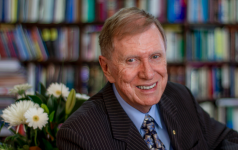Marriage Equality: An Interview with Former High Court Justice Michael Kirby

At 2.15 pm on Thursday, the High Court of Australia ruled against the challenge to the voluntary and non-binding marriage equality postal vote. As he sat in parliament, Malcolm Turnbull was told of the decision via text, which is a lot more instantaneous than snail mail.
The prime minister rose to his feet and told the chamber, “The leader of the opposition must be relieved that the promise he made to the Australian Christian Lobby in 2013 is now being delivered by the Coalition.” He then added, that he’ll be voting yes.
And thus the politicking around the issue of whether LGBTIQ Australians can exercise their right to marry continues.
The High Court challenge
Two challenges to the postal vote were launched by marriage equality advocates and the cases were heard simultaneously in the High Court.
Those that mounted the challenges argued that the $122 million postal vote is unconstitutional as it involves using laws to access funds available only in circumstances that are urgent and unforeseen. And the group pointed out that there is nothing about the postal vote to warrant this.
However, solicitor general Stephen Donaghue countered there argument by stating “urgency is a relative concept.” He further told the court that the finance minister was acting lawfully in withdrawing money from the contingency fund.
And the full bench of the High Court agreed with him.
The Smith bill
The Turnbull government announced the same-sex marriage postal vote on August 9, after the Senate rejected legislation to enable a plebiscite on the issue for a second time. This was despite many parliamentarians calling on the government to hold a free vote on the issue in parliament.
On the Sunday prior to the announcement, Liberal senator Dean Smith released his marriage equality bill, and, along with four other Liberal MPs, released a statement advocating for a free or conscience vote.
The Smith bill redefines the definition of marriage, as well as making provisions to protect ministers of religion. The Equality campaign praised the bill as the most “robust and genuine approach” to same-sex marriage parliament has seen.
The great dissenter
One of the most damaging consequences of the national vote is that the LGBTIQ community will be subjected to vilifying material and conduct during the no campaign.
Despite the government rushing to introduce new laws to prevent this, the examples are already out there. Disturbing posters appeared in a Melbourne laneway. A group in Sydney is organising a Straight Lives Matter rally. And then there’s the bizarre logic behind that television advert.
Former High Court Justice Michael Kirby has been one of the most vocal critics of the postal vote. He told ABC News radio on the day after it was announced that he felt the process was treating the LGBTIQ community in a second-class way.
Mr Kirby served on the bench of the High Court from 1996 to 2009.
During this time, he became known as the great dissenter, due to the amount of times he disagreed with the court’s decisions. But, with the strong support in the community for the yes campaign, it seems Mr Kirby will be in agreement this time.
Sydney Criminal Lawyers® spoke with Mr Kirby about the implications of holding a vote in this manner for the LGBTIQ community, his time on the bench of the High Court, and the benefits of same-sex marriage.
Firstly, Mr Kirby, the postal vote on marriage equality is set to go ahead. Will you be voting?
Yes.
This is a turnaround on what you initially said. Why did you change your position?
The initial response was based upon the experience of my partner, Johan, growing up in the Netherlands during the Second World War and the German occupation.
After the war, there was a great deal of recrimination against those people who in anyway had cooperated with inequality and discrimination. And that taught him a lot of lessons. He said that he didn’t want to take part in a postal ballot, which would be discriminating against him, in a way that was unacceptable. Such surveys had not been used when Australia enlarged the rights of Aboriginal people, women, the old, Asian-Australians, the disabled or others. Only gays.
However, subsequently he changed his mind and said that we should not give the enemies of equality a free kick. When he changed his mind, I changed my mind. We have been together 48 years and we always discuss and usually agree on important issues.
You’ve been a critic of the postal vote since it was announced. What are the implications for the LGBTIQ community of having a decision on their rights made in such a manner?
The objection to having a person’s legal equality determined by a vote of any kind, outside the Parliament, is obvious. You don’t allow people’s fundamental human rights or their fundamental legal rights to be determined by the votes of a majority of other people. That is simply self-evident.
In countries that have a proper constitutional protection for the equality principle it is upheld by the courts. For example, it was upheld in California, when a vote narrowly accepted a proposition that was antagonistic to the rights of gay people. But that vote was then set aside by the Federal Court, which said you couldn’t submit people’s rights to equality to the votes of the majority.
So that is the fundamental basis for the criticism of engaging in a vote before our Federal Parliament determines the matter.
Normally, in Australia, we decide matters of basic rights in Parliament. That is in our constitution. It also has wisdom because it requires reasons to be given and debates to take place in Parliament, which are generally respectful. And if votes of conscientious opinion are taken, to allow members to determine matters on a free vote, then citizens will generally accept that determination, at least for a time.
All of these are reasons why the postal ballot is not acceptable. It has not been used in a matter like this for a hundred years in Australia. It’s a bad precedent. We shouldn’t go ahead with it. I hope either the courts or the Parliament will reverse this initiative.
Australian Liberal Senator Dean Smith released his marriage equality bill just ahead of the postal vote announcement. The bill, which was praised by the Equality campaign, makes provisions to protect ministers of religion.
What is your take on the Smith bill?
I haven’t studied the bill closely, though, I have great respect for Senator Dean Smith. And I know that he would be trying to reflect the opinion of the Senate Committee in providing exceptions to marriage equality that were acceptable and reasonable.
No one that I know believes that religious ministers should be forced to undertake a marriage of a same-sex couple. The present Marriage Act gives exemptions in that case. The Smith bill extends slightly the exemptions. In that respect it coincides with the report of the Australian Senate Committee.
It looks to me like a sensible compromise proposal that should be accepted by all people. That is at least people who don’t have a fundamental objection to same-sex marriage which is unnegotiable in any circumstances.
Sadly, there are people in our society who have such objections. And sadly and surprisingly, many of those people claim to be religious.
In the High Court, you were known as the great dissenter, as you disagreed with the court’s ruling about half the time.
Looking back, why do you think your opinion was at odds with the decision of the court so much of the time?
I was appointed to the High Court very soon after the decision in the Mabo case: Mabo v Queensland (No 2) 1992. After that decision, and particularly, after the Wik decision in 1996 which was delivered very soon after I joined the High Court, the deputy prime minister said, apparently with the approval of the Coalition parties, “We must appoint capital C conservatives [to the High Court].”
The government proceeded to appoint conservative lawyers to the High Court. It’s not difficult to get talented lawyers who are socially conservative, and who take conservative positions where issues of values are involved.
Issues of values are often involved in cases that come to the High Court of Australia. That’s the nature of the jurisdiction of the court. They’re not determined just on the language of the constitution, or on an Act of Parliament, or previous Common Law rulings. They frequently depend on the governing values of the decision maker.
I was a member of the High Court at a time when the balance of the membership shifted from the Mason court, when the balance was liberal, to the balance of the Gleeson court, when it was conservative. Just as deputy prime minister Fischer promised it would be.
That I think helps to explain the differences that I faced. I am not of course complaining or saying that in any way the Justices of the Court during my time were dishonest or betrayed their oaths as Justices of the Court. They were just conservative lawyers. I’m not a conservative lawyer. So differences were bound to happen.
In fact, the level of dissent was not 50 percent. If you include the special leave applications, and the many other tasks that the High Court performs, it was much lower than 50 percent.
But, in the High Court you get cases which are difficult, and on which reasonable people can disagree. And that is what happened. They did their duty. I did my duty. And it’s up to the legal profession, the judiciary, and the citizens to decide which was the correct outcome for the cases.
The last High Court case you were involved in the majority of the justices found that an amendment to the Aboriginal Land Rights Act that allowed the Commonwealth to take five-year leases over land, communities and town camps was valid.
This amendment was part of the measures that were taken under the Northern Territory Invention. You were the sole dissenter and it was reported you accused your fellow justices of being racially biased in their ruling.
Would you say the example of racial discrimination towards Aboriginal people in this case was an anomaly or is it something more pervasive throughout the Australian judicial system?
I did not accuse my colleagues in the Wurridjal case of being ‘racially biased’. My focus was on the law, which was before the Court under challenge by Mr Wurridjal and by his people.
I was addressing whether the law, as enacted by the Federal Parliament for the Northern Territory Intervention, contained provisions that did not conform to the Australian constitution.
The Australian constitution provides that if the property of anybody in Australia is taken, the Commonwealth has to provide “just terms”.
This provision is different from the United States constitution where the constitution provides that the federal government must give “just compensation” in that case.
There is a difference between “just terms” and “just compensation.” Inferentially, it is deliberate.
Mr Wurridjal argued that “just terms” required consultation with the Aboriginal community. I said that was a distinctly arguable proposition, given the differentiation of the language of the Australian and the United States constitutions and the lessons we could learn from that. That view did not appeal to the majority of the High Court.
Looking back, I think we can see that the Northern Territory Intervention, whatever its motivation, was not a good thing for the Aboriginal people. When I was in Darwin two weeks ago, that was certainly the message that was given to me, not only by Aboriginal Australians, but also by others.
As to whether there is bias against the Aboriginal people in the Australian legal system, I prefer to say it is in the law, rather than in the courts. The courts have to apply the law and the law has often reflected the discrimination that existed in the Australian community against people, by reason of their race.
That was the whole basis of the discrimination against people of the Aboriginal and other Indigenous races in having their land rights recognised. And that was called to attention by Justice Brennan in his reasons explaining the High Court’s decision in Mabo v Queensland (No 2) in 1992.
Australians do seem to have a problem with people of different races. Only that can explain the White Australia Policy. I think it’s also arguably present in some of the policies our country has adopted in respect of refugee applicants.
Certainly, in the Wurridjal case there should have been consultation before the intervention. And certainly, in the dealing with refugees there should be a termination of long-term detention. But at the moment there is not.
So race is a big issue in Australia. We have to come to grips with it and overcome it. If we had a proper constitution with a Bill of Rights that protected all people against racism that would be a good thing. Most countries have that. Australian does not.
Mr Kirby you served as a Justice of the High Court of Australia for thirteen years. Out of all the cases you sat on, which would you say has the most significance for you today and why?
I’m often asked that question. It seems to be something that is intriguing to young people.
To be honest, I found almost all of the cases important and interesting. My problem was never that of going to sleep in court. My problem was hyper-involvement.
It was a great privilege to serve on the High Court of Australia. I did my best in my service there. I don’t want to isolate any particular case because all of the cases were important to the people who brought them. And my reasons in them have to be judged by others, rather than by me.
And lastly, with momentum growing around the world for marriage equality, it seems highly likely that regardless of the outcome of the postal vote, eventually, marriage equality will be a reality in Australia.
What sort of benefits will marriage equality bring to Australian society as a whole?
Same-sex marriage is recognised now in 25 countries. Most of the countries are legally similar to Australia. They have recognised it in their law, either by parliamentary action or by decisions by their courts relying on human rights provisions.
It therefore seems likely to me that Australia will eventually adopt the principle that marriage is available to people, irrespective of their sexual orientation or gender identity. I certainly hope that that will happen.
The benefits include the benefits of equality. A citizen should not suffer discrimination simply because they are of a different sexual orientation. Particularly, where that is, and has been shown to be, irrelevant.
The countries that have accepted same-sex marriage now number a population of 760 million people. So that’s a lot of people living with provision for same-sex marriage.
Scientific exploration of the consequences of that law has been that it is beneficial for the people who get married.
Getting married appears to be good for your health. Commitment gives stability of life. It provides advantages for physical health and mental health. It is also beneficial for children to be loved, supported and brought up by two parents.
Therefore, the questions is: why is that civic right, provided under a secular constitution, enacted in a secular Parliament, not allowed for people who happen to be LGBTIQ?
When that question is asked, the answer appears to be that some people, generally on the basis of their religious views, feel that it should be denied to people who are of a different sexual orientation or gender identity to themselves.
That is not an acceptable reason. And it should be rejected.
Mr Kirby thanks very much for taking the time out to have this chat with us today. It’s certainly been an honour to speak with someone with such an illustrious career as yourself.
Thank you very much.
Photo credit: Sasha Hadden







